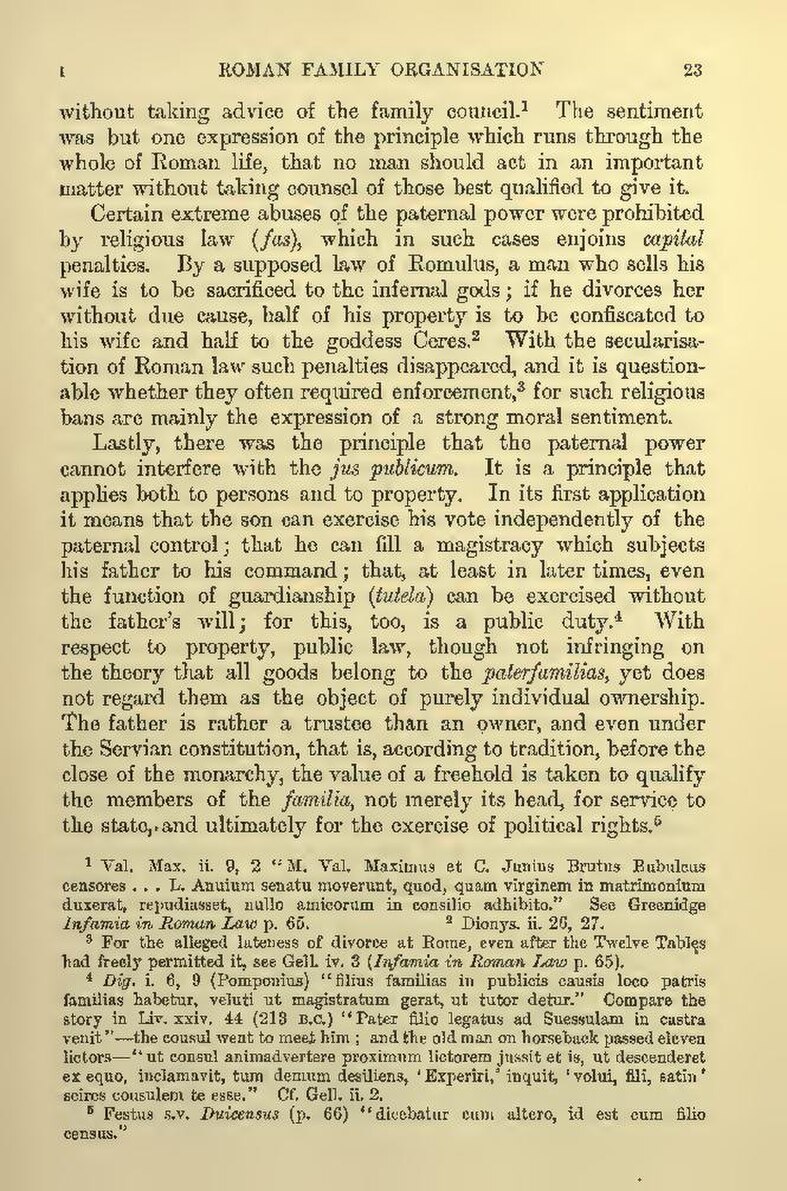without taking advice of the family council.[1] The sentiment was but one expression of the principle which runs through the whole of Roman life, that no man should act in an important matter without taking counsel of those best qualified to give it.
Certain extreme abuses of the paternal power were prohibited by religious law (fas), which in such cases enjoins capital penalties. By a supposed law of Romulus, a man who sells his wife is to be sacrificed to the infernal gods; if he divorces her without due cause, half of his property is to be confiscated to his wife and half to the goddess Ceres.[2] With the secularisation of Roman law such penalties disappeared, and it is questionable whether they often required enforcement,[3] for such religious bans are mainly the expression of a strong moral sentiment.
Lastly, there was the principle that the paternal power cannot interfere with the jus publicum. It is a principle that applies both to persons and to property. In its first application it means that the son can exercise his vote independently of the paternal control; that he can fill a magistracy which subjects his father to his command; that, at least in later times, even the function of guardianship (tutela) can be exercised without the father's will; for this, too, is a public duty.[4] With respect to property, public law, though not infringing on the theory that all goods belong to the paterfamilias, yet does not regard them as the object of purely individual ownership. The father is rather a trustee than an owner, and even under the Servian constitution, that is, according to tradition, before the close of the monarchy, the value of a freehold is taken to qualify the members of the familia, not merely its head, for service to the state, and ultimately for the exercise of political rights.[5]
- ↑ Val. Max. ii. 9, 2 "M. Val. Maximus et C. Junius Brutus Bubulcus censores . . . L. Annium senatu moverunt, quod, quam virginem in matrimonium duxerat, repudiasset, nullo amicorum in consilio adhibito." See Greenidge Infamia in Roman Law p. 65.
- ↑ Dionys. ii. 26, 27.
- ↑ For the alleged lateness of divorce at Rome, even after the Twelve Tables had freely permitted it, see Gell. iv. 3 (Infamia in Roman Law p. 65).
- ↑ Dig. i. 6, 9 (Pomponius) "filius familias in publicis causis loco patris familias habetur, veluti ut magistratum gerat, ut tutor detur." Compare the story in Liv. xxiv. 44 (213 B.C.) "Pater filio legatus ad Suessulam in castra venit"—the consul went to meet him; and the old man on horseback passed eleven lictors—"ut consul animadvertere proximum lictorem jussit et is, ut descenderet ex equo, inclamavit, tum demum desiliens, 'Experiri,' inquit, 'volui, fili, satin' scires consulem te esse." Cf. Gell. ii. 2.
- ↑ Festus s.v. Duicensus (p. 66) "dicebatur cum altero, id est cum filio census."
